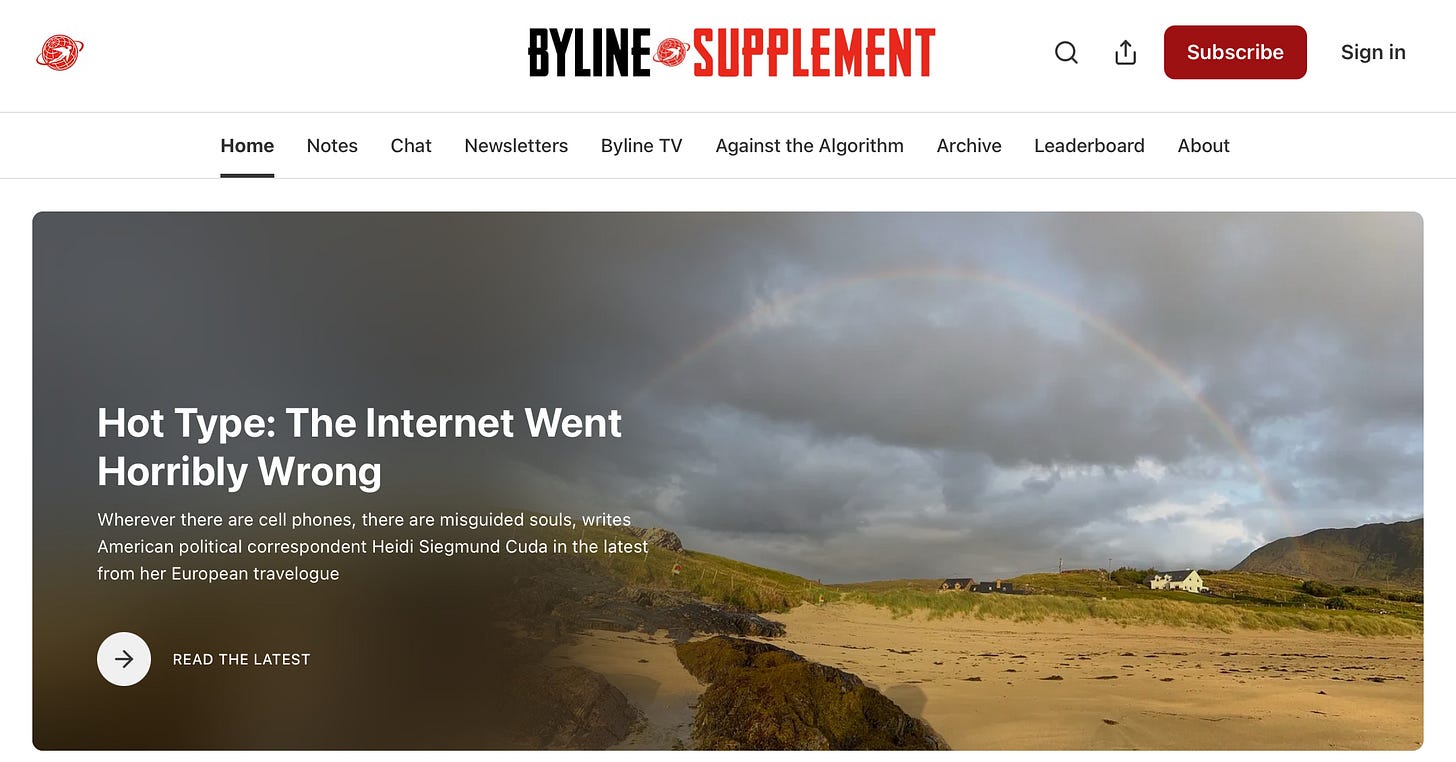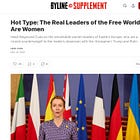‘The Internet Went Horribly Wrong’ — My Latest Hot Type Column in Byline
In my Hot Type column for Byline Supplement, I offer snapshots from my travelogue, noting how radicalization is everywhere people have cell phones. I wanted to call this column ‘Nuke the Internet’
***Please take out a membership to support the light of truth.***
“Now we know that truth is something that does not come naturally in an unnatural world. But the real world, the one where waves crash on a seaweed-strewn beach, and ruby red sea anemones cling to the side of tide pools, and double rainbows spontaneously appear, that world doesn’t lie.”—me in Hot Type for Byline Supplement
In my weekly Hot Type column for Byline Supplement, I share postcards from the edge — offering vignettes from my European travels, while noting that anywhere there’s a cell tower, you’ll find radicalized people sucked into the disinformation vortex.
Here is my report:
Thank you as always to everyone who supports my work here and at Byline. I believe the work of independent investigative reporters exposing the transnational crime wave has revealed the failing of corporate media in stark contrast.
If you are not yet a member of Byline, I urge you to become one or to take advantage of unlocking a free report. If you are unable to become a member at this time, I am authorized to send the full report to those who request it at bettedangerous/gmail.
Below is an excerpt:
Hot Type: The Internet Went Horribly Wrong
Wherever there are cell phones, there are misguided souls, writes American political correspondent Heidi Siegmund Cuda in the latest from her European travelogue
More often than not, the cab drivers I meet in Europe appear to be addicted to Facebook. Scrolling and scrolling through news and trauma porn as they wind their way through once medieval streets. Some appear so addicted, they can barely operate their vehicles safely.
Often they rant about immigrants, despite many being immigrants themselves. They comment on the increase in crime, even though with the slightest investigation, the facts undermine their concern. Many complain about people on social support, as if they’re a Rockefeller in a cigar smoke-filled room instead of driving a cab.
Radicalization is everywhere there are cell towers.
Sometimes, I find myself in a calmer part of the world — coastal towns where fishing rods are more prized than iPhones.
I find myself living and breathing in the small talk — I learn so much about a people and their culture in checkout lines at markets or the ‘modern politics’ section of bookstores. Quiet, brief conversations offer a temperature check on how a community is doing.
But in truth, the plague of disinformation and radicalization is everywhere. Asymmetrical warfare is cheap, and the internet has made it scalable.
Anyone from Anywhere
I picked up a copy of Peter Pomerantsev’s book, This Is NOT Propaganda: Adventures in the War Against Reality, at Shakespeare & Co bookstore in Paris, and have been reading it on trains and metros throughout the EU. It’s not lost on me that propaganda by throwaway agents and useful idiots permeates the air. Free speech, and all.
I keep returning to this highlighted page:
“We live in a world of influence operations run amok, where the means of manipulation have gone forth and multiplied, a world of dark ads, psy-ops, hacks, bots, soft facts, fake news, deep fakes, brainwashing, trolls, ISIS, Putin, Trump… anyone from anywhere can influence everyone everywhere.”
He explains that “Russia, with its social media squadrons, haunts these maps. Not because it is the force that can still move earth and heaven as it could in the Cold War, but because the Kremlin’s rulers are particularly adept at gaming elements of this new age, or at the very least are good at getting everyone to talk about how good they are, which could be the most important trick of all.”
As I travel from city to city, I see the impacts of radicalization in the graffiti, on sign posts, in murals.
A pop-up storefront in Belfast, Ireland, offers merchandise for sale to support citizens who are the targets of war crimes. With two new reports from the United Nations and Human Rights Watch confirming that Russia is committing crimes against humanity in Kherson, Ukraine, by hunting people with drones, I assume I can find a t-shirt or poster in support of Ukraine at the storefront.
When a member of my travel group, wearing a Ukrainian pin, inquires about why there are no Ukrainian flags, he was met by a young man who worked there with a Russian-sounding accent, who said they had nothing in support of Ukraine.
Within a few seconds, the young man said — without any shame — he was actually in support of Russia, as if the appalling nature of his comment had never occurred to him. He then began rather weakly spouting the usual Russian talking points against Ukraine. He was met with a barrage of counter-arguments by me and others. But he continued robotically repeating all the reasons why he did not support Ukraine.
Politely, I thanked him for who and what he does support, and as I left, I thought, he must be a drop out from KGB charm school.
I rejoined my guide from Belfast Political Tours, who had done 12 years in prison during the Troubles. He was Catholic, and he explained to our tour group that the Troubles were never about religion. They were about anti-colonialism.
I learned so many vital things from him, but a few things really stuck out. One, that sometimes building the peace is harder than fighting the war. And two, how America’s Civil Rights movement had served as profound inspiration for the people of his community. He now spends his days, still haunted by his friends who perished for their convictions, trying to heal old hatreds.
As I walked through the streets of Belfast in Northern Ireland, I wondered if America’s Civil Rights movement could inspire America again, were there lessons that we can draw on from our own history to defeat our Troubles? Or are we simply too far gone — too far down the technofascist rabbit hole to see our way out?
Praying in Sacred Spaces
Other than writing and reporting, I don’t know how else to be helpful in troubled times, so I pray in sacred spaces…
I light candles in every cathedral, hoping for a deus ex machina to save my country and bring peace on earth.
It can’t come until we find a way to neutralize the internet, which went horribly wrong.
I wanted to call this column, ‘Nuke the Internet’.
I didn’t because we — you and I — are connected through the internet, and that is a good thing.
But we have to press pause, and acknowledge the sickness is global…
Now we know that truth is something that does not come naturally in an unnatural world.
But the real world, the one where waves crash on a seaweed-strewn beach, and ruby red sea anemones cling to the side of tidepools, and double rainbows spontaneously appear, that world doesn’t lie.
****
The above is an excerpt of my Hot Type column, which was originally published Saturday, June 7, 2025, in Byline Supplement.
To support one of the last truly independent, reader-funded newspapers in the world, check out Byline Times and its magazine Byline Supplement. As noted above, if you are unable to support Byline Supplement at this time, and wish to read any of my paywalled columns in full, please reach out to me at bettedangerous/gmail, as I am authorized to send upon individual request.
Bette and Byline members, please forward the column to your allies.
It also means a great deal to me when you like and share my work here and at Byline. It really helps our Byline team when you share our reporting with your personal network. We reached a milestone this month, with nearly one million views, and this growth is only possible with support from our readers.
Those of you in Europe, please consider attending Byline Festival in July. I will be featured on a panel with women on the frontline of the information war, which includes our keynote speaker Carole Cadwalldr.
I am so glad you are here, and eternally grateful that you support an anti-fascist mother doing her best in these dark days.
****
****
Related:
****
Bette Dangerous is a reader-funded magazine. Thank you to all monthly, annual, and founding members.
I expose the corruption of billionaire fascists, while relying on memberships for support.
Thank you in advance for considering the following:
Share my reporting with allies
Buying my ebooks
A private link to an annual membership discount for older adults, those on fixed incomes or drawing disability, as well as activists and members of the media is available upon request at bettedangerous/gmail. 🥹
More info about Bette Dangerous - This magazine is written by Heidi Siegmund Cuda, an Emmy-award winning investigative reporter/producer, author, and veteran music and nightlife columnist. She is the cohost of RADICALIZED Truth Survives, an investigative show about disinformation and is part of the Byline Media team. Thank you for your support of independent investigative journalism.
🤍
Begin each day with a grateful heart.
🤍







=] I pray in sacred spaces too, even though I have never been involved with any religion and don't even believe prayer changes anything... except me =]